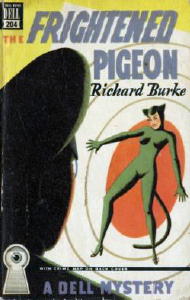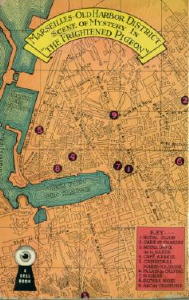Sun 15 Apr 2007
RICHARD BURKE – The Frightened Pigeon
Unicorn Mystery Book Club; hardcover reprint, June 1946. First Edition: G. P. Putnam’s Sons, 1944. Paperback reprint: Dell 204, mapback edition, 1947.
When Victor Berch, Bill Pronzini and I did our annotated bibliography of the Ziff Davis line of Fingerprint Mysteries , we included a short profile of Richard Burke, which of course you should go read. Many of his books, we said, involved a Broadway private detective named Quinny Hite, but as it happens, this is not one of them. In fact The Frightened Pigeon takes the reader to another part of the world and (one imagines) another kind of mystery altogether.

But first a word on the cover that’s shown, though, before getting down to details. This is, of course, the Dell mapback edition that’s mentioned above, and in case you can’t make out the details, the map on the back below is that of the city of Marseilles, which is where the last eighty percent of the story takes place.
The setting of the first fifty pages is Paris, 1942, with the Germans solidly in control of the city. An American dancer named Valerie Bright is still there, however — the pigeon of the title –- and very determined to stay non-political. From page 8, of the Unicorn edition:
Her close male friend, Charles John Dillon, nicknamed “Ching,” is working closely with the French underground, however, and events, beginning with a stolen German diary, bound to be embarrassing if it falls into the wrong hands — as, for example, into Ching’s hands — soon make the light-hearted Val realize how dirty — and dangerous — war really is, not knowing what will happen next nor whom your friends really are. By page 40, she is one frightened pigeon indeed, as off to Marseilles they and a small group of displaced others go, hoping to find a way out of France and its closed borders.

The diary appears and disappears with amazing regularity. It is, in fact, amazing, how much mileage an author (Burke) can make of one small important object. Otherwise here is a novel one can learn a large amount from — supposing, that is, that one has never been in a place controlled by Nazi-like enemies one is trying his or her best to avoid — both in term of locale (well-described) and people, especially those like Valerie, whose mind is soon brought down to earth in satisfying (but not very surprising) fashion, but also the large number of others who find themselves caught up in events far beyond their say.
Don’t get me wrong. This is by no means a major work. It’s no more than ordinary at best, in the overall scheme of things, but what it does have is atmosphere, and plenty of it.